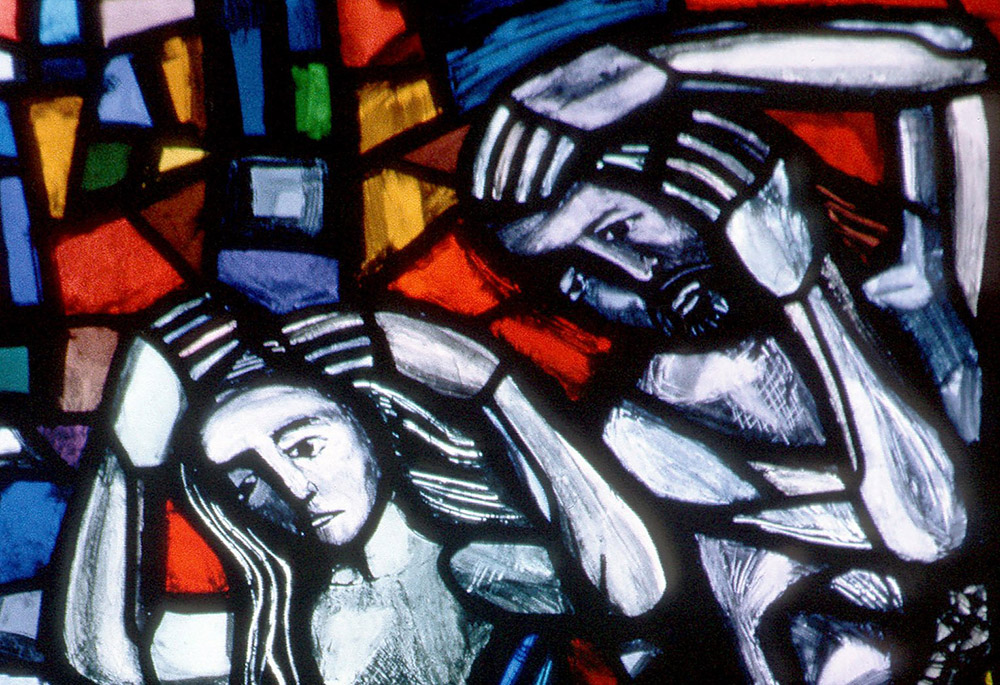
Adam and Eve are depicted in a stained-glass window at St. Nicolas Church in Feldkirch, Austria, in a 2004 file photo. (CNS photo from Crosiers)
Eve and Adam. Are any mythical characters better known than they? For eons, Christians have blamed them for death and evil in the world. That theory leads directly to theologies that focus on sin as the decisive motive for the Incarnation. "O happy fault!"
The story of Genesis 3:9-15 might be best understood as a fable explaining the origins of evil. For some, the story has a simple moral: God's creation was perfect until humans messed it up. But after Darwin, we can no longer claim our two primordial parents. Now we know that some 315,000 years ago, people in Africa evolved, developing abilities that distinguished them from other creatures. These skills included an extraordinary ability to adapt, learn collectively and use symbolic language.
One modern biblical commentary, The Torah, A Modern Commentary, suggests that the first couple's happy fault described an evolutionary leap from innocent indifference to the ability to distinguish and choose between right and wrong. Humans became capable of self-giving love, incredible progress, mistakes and intentional evil. Once started, there was no turning back. When they stepped into the precarious world of free choice, Eve and Adam (Homo sapiens) exited the garden of blissful ignorance forever. Their new consciousness changed everything. Our species could not but continue to adapt and change, and to think critically.
While Genesis 3:15-19 itemizes the couple's punishments for breaking the law — a summary list of humanity's key problems — knowledge of evolution shows that each advance makes life more complex and riskier. In the last 2,500 years, brave prophets have tried to awaken us to the responsibility that comes with our advances. They point out that by choosing to better our interactions with everything around us, we can create a better world. Mark's Gospel shows us how well that turns out.
Jesus' preaching and healing made him immensely popular with some and a threat to others. Some believed he wanted to unseat them; others were jealous. Some deeply religious people feared that he was satanic. His own family worried that he was demented. Jesus' good news was too much, too new and different for many of his contemporaries.
What unsettled both believers and doubters? Nothing more than his core message: "The reign of God is at hand." That might not sound so bad, but its implications were earth-shattering. When Jesus said, "Repent and believe the good news," he wasn't talking about sin and remorse. That's easy.
The Greek word for repent, metanoia (metanoeo), conveys Jesus' invitation to see everything with new eyes, to discover God's reigning and to join in. "Repent" invites us to venture into a new stage of evolution, to allow God to lead us into becoming more than we had ever imagined. Large crowds heard that and were electrified because Jesus taught with authority; he embodied the promise and effects of metanoia. Faith in this good news enabled disciples to begin to act like Jesus, going beyond old boundaries designed to keep them safe and pure — and exclusive.
Mark's story about Jesus and his mother, sisters and brothers presents a parable in action to depict the radicality of metanoia. Jesus' family, those to whom he had belonged from birth, were looking for him because they couldn't comprehend what he was doing or how people were responding to him. When he heard that his family had arrived, his response was scandalous: "Whoever does the will of God is my brother and sister and mother."
Jesus' call to metanoia entailed a rejection of every type of exclusivity, be it family, ethnic, tradition, heritage, classism, sexism or nationalism. In Jesus' vision of God's reign, the measure of every action and relationship rests simply on how it fosters or impedes love and human thriving.
Advertisement
Today, many might agree with the family's opinion that Jesus had gone off the deep end. Although they probably would say it more politely with statements like, "That's just not practical," or "But in the real world …", the message remains the same.
To that, Jesus' replies uncompromisingly: "Those who blaspheme against the Holy Spirit will never have forgiveness!" Being closed to metanoia, to new insights, to a frightening, but grace-filled and ever-growing relationship with God and others, impedes and denigrates the Holy Spirit. That stance remains unforgivable until a person decides to be open to the newness of grace.
Jesus' focus on metanoia's good news suggests that the Trinity's motive for the incarnation had less to do with sin than with God's deep desire that we continue to evolve, becoming mothers, brothers and sisters with and in Christ.
As with Adam and Eve in the garden, our evolution and growth will undoubtedly include many falls, but participating in the emerging reign of God makes it worth the risk.
